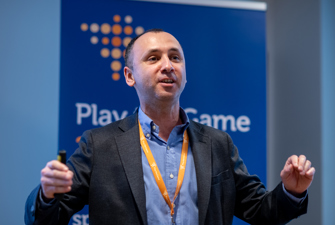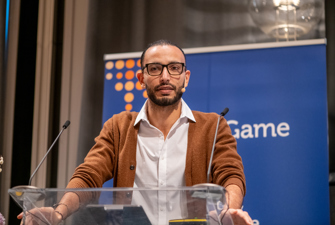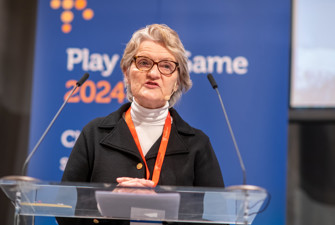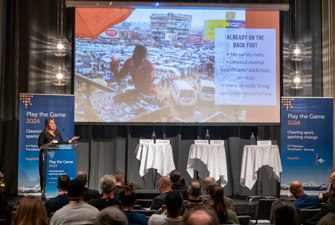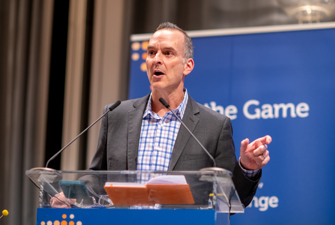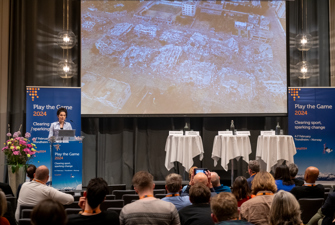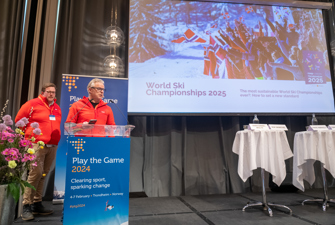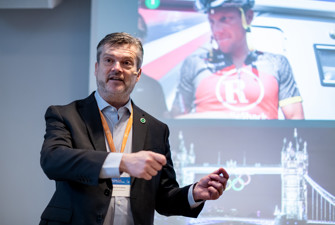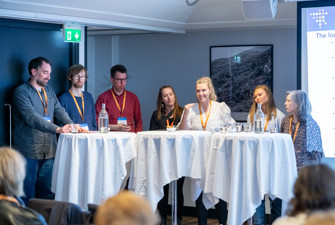The Global South could be the key to changing poor sports governance nationally and internationally
Brian Wesaala, founder and CEO of The Football Foundation for Africa, says that more corporation across the Global South is needed to strengthen the weakest link in world sport.
For many years, corrupt national and regional sports leaders in the Global South have been accused of keeping presidents of international sports federations such as the IOC and FIFA in power for years and sometimes decades without holding them accountable for bad sports governance.
But if the panel discussion on sports governance in the Global South that took place at the Play the Game 2024 is anything to go by, several countries in Africa and South America are slowly changing a long tradition of poor sports governance. It's a change that in the long run could give the Global South the power to improve the international sports world's general challenges with poor governance of both national and international sports organisations.
"By addressing the challenges in the Global South, we might also be able to address global issues that are affecting international sport," Brian Wesaala, founder and CEO of The Football Foundation for Africa, told Play the Game after the debate.
"You need to strengthen your weakest link. In this case, Africa is the weakest link. If we can strengthen Africa, we can strengthen the global sports system."
Poor governance is more visible in the Global South
Brian Weseela, who is from Kenya, took part in the panel debate with a presentation on how the governance of African football can be improved by challenging traditional structures in the sport.
While there are many examples of sporting organisations in the Global North also being plagued by serious sports-related crimes such as corruption, match-fixing, doping, violence among fans and sexual assault to name a few, the Kenyan points out that there are differences between the governance of sport in the Global North and the Global South:
"In the Global South, the economic challenges of sport and examples of poor governance are much more visible than in the Global North. The lack of qualified professional sports leaders and the corruption in the Global South is quite evident," says Wesaala.
"It's a huge challenge. We need to look at ourselves and ask each other what can we do to change the tradition of poor governance of sport in the Global South. How do we work with governments and academics in each country to build better national sport governance and sport structure?"
In the panel discussion, Steffany Ndei, who holds a master in sports ethics and integrity from KU Leuven in Belgium, spoke about her studies of the Kenyan Football Federation and FIFA, while Mazin Abusin, president of the Sudan Youth Sports Authority, talked about AI-driven capacity enhancement and how to empower African member associations for greater independence.
From South America came professor Julie Hortencia Gómez Solano from Fundación Universitaria del Área Andina in Colombia and her compatriot professor Ana Maria Arias Castanó from Universidad de Ciencias Aplicadas y Ambientales (UDCA).
The two Colombian academics focused on how different governance structures and citizen participation can help improve the management of national sports organisations.
Based on her research, Ana Maria Arias Castanó concluded:
"It is possible to legitimise processes in sports organisations and promote social control with the participation of interest groups. This limits bad practices and capricious decisions that lead to corruption in the sector."
Cooperation across the Global South could help
To Wesaala, the Colombian research in sports governance is interesting:
"We need more cooperation across countries in the Global South. The Colombian research on the structure and governance of sport may also be of interest to African countries instead of always looking at what is going on in the big international sports organisations like FIFA," he says.
"Maybe we can find more relevant partners in countries like India, Colombia and Brazil and at the same time make ourselves less dependent on FIFA. The Play the Game conference has given us a good platform to explore this in an attempt to address the visible challenges of poor sports governance in the Global South."
At the same time, the Kenyan calls on all sports leaders in the Global South to pay much more attention to the debate on the national and international governance challenges of sport.
"In the Global South, it's only a local, national debate, even though some of the challenges we face are global. For example, how does the Middle East's heavy investment in sports affect countries in Africa, where many of the Middle East's migrant workers come from?"
For the same reason, Wesaala hopes that African trade unions and other organisations outside of sport in the Global South will become more involved in the sports governance debate in the future:
"In African sport, nobody is holding anyone accountable."
